
Mini Dental Implant Centers of America - Wayne, NJ
Dentistry Wayne
Mini Dental Implants in New Jersey
- Landline
- (973) 636-4646
- Fax
- (973) 633-1903
- @FineDentalNJ
- FineDentalCare
- Video
- www.youtube.com
- Video
- www.youtube.com
- Video
- www.youtube.com
- Video
- www.youtube.com
- Video
- www.youtube.com
- Video
- www.youtube.com
- Video
- www.youtube.com
- Video
- www.youtube.com
- Video
- www.youtube.com
- Video
- www.youtube.com
- Video
- www.youtube.com
- Video
- www.youtube.com
- Video
- www.youtube.com
- Video
- www.youtube.com
- Video
- www.youtube.com
- Video
- www.youtube.com
- Video
- www.youtube.com
- Video
- www.youtube.com
- Video
- www.youtube.com
- Video
- www.youtube.com
- Video
- www.youtube.com
- Video
- www.youtube.com
- Video
- www.youtube.com
- Video
- www.youtube.com
- Video
- www.youtube.com
- Video
- www.youtube.com
- Video
- www.youtube.com
- Video
- www.youtube.com
- Video
- www.youtube.com
- Video
- www.youtube.com
- Video
- www.youtube.com
- Video
- www.youtube.com
- Video
- www.youtube.com
- Video
- www.youtube.com
- Video
- www.youtube.com
- Video
- www.youtube.com
- Video
- www.youtube.com
- Video
- www.youtube.com
- Video
- www.youtube.com
- Video
- www.youtube.com
- Video
- www.youtube.com
- Video
- www.youtube.com
- Video
- www.youtube.com
- Video
- www.youtube.com
- Video
- www.youtube.com
- Video
- www.youtube.com
- Video
- www.youtube.com
- Video
- www.youtube.com
- Video
- www.youtube.com
- Video
- www.youtube.com
- Video
- www.youtube.com
- Video
- www.youtube.com
- Video
- www.youtube.com
- Video
- www.youtube.com
- Video
- www.youtube.com
- Video
- www.youtube.com
- Video
- www.youtube.com
- Video
- www.youtube.com
- Video
- www.youtube.com
- Video
- www.youtube.com
- Video
- www.youtube.com
- Video
- www.youtube.com
- Video
- www.youtube.com
- Video
- www.youtube.com
- Video
- www.youtube.com
- Video
- www.youtube.com
- Video
- www.youtube.com
- Video
- www.youtube.com
- Video
- www.youtube.com
- Video
- www.youtube.com
- Video
- www.youtube.com
- Video
- www.youtube.com
- Video
- www.youtube.com
- Video
- www.youtube.com
- Video
- www.youtube.com
- Video
- www.youtube.com
- Video
- www.youtube.com
- Video
- www.youtube.com
- Video
- www.youtube.com
- Video
- www.youtube.com
- Video
- www.youtube.com
- Video
- www.youtube.com
- Video
- www.youtube.com
- Video
- www.youtube.com
- Video
- www.youtube.com
- Video
- www.youtube.com
- Video
- www.youtube.com
- Video
- www.youtube.com
- Video
- www.youtube.com
- Video
- www.youtube.com
- Video
- www.youtube.com
- Video
- www.youtube.com
- Website
- www.minidentalimplantswaynenj.com
- Reservations
- www.minidentalimplantswaynenj.com
- Menu
- www.minidentalimplantswaynenj.com
Description
At the Mini Dental Implant Center of America in Wayne, New Jersey, we’re not just focused on advanced dental solutions; we’re also the chosen destination for dentists themselves. Dr. Bruce Fine is the dentist that other dentists trust for their dental needs, thanks to his unparalleled experience and skill. Our primary focus is providing advanced solutions for dental concerns, particularly mini dental implants to replace missing teeth and secure loose, ill-fitting dentures. With over 38 years of experience, Dr. Fine is a highly regarded authority in the dental community, especially in implantology. He holds Fellowships from the Academy of General Dentistry, the International Congress of Implantologists, and the Institute for Advanced Laser Dentistry, along with a Mastership from the American Academy of Dental Sleep Medicine. His expertise isn’t limited to mini dental implants; he’s also quite adept in Invisalign, All-on-X dental implants, cosmetic dentistry, sleep medicine, laser dentistry, and general dentistry. Dr. Fine’s practice in Wayne, NJ, established in 1987, is not just a local hub but a global one. Patients travel from around the world to experience his dedicated care and expertise. His commitment is unwavering: to ensure every patient receives the best possible care and comfort to achieve the healthiest and most beautiful smile. Contact us today for a free consultation and start your journey towards optimal dental health with a dentist who’s trusted by dentists themselves.
Reviews
Opening hours
Payment Options
American Express , Visa , Cash , Discover , Financing , MasterCard
Products And Services
-
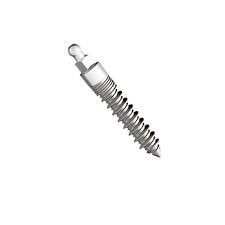
Mini Dental Implants
In New Jersey, approximately 30% of adults aged 65 years and older have lost at least six teeth due to decay or gum disease. Losing teeth can significantly impact your daily habits, affecting your ability to eat, speak, and feel confident about your appearance. Mini dental implants replace missing teeth, helping patients struggling with tooth loss restore their oral function and quality of life. These narrow-diameter implants are a popular choice for those looking to address tooth loss quickly and effectively, as they often provide better outcomes than traditional implants. Dr. Fine, a fellow in the International Congress of Oral Implantologists, has placed dental implants since 1989. Recognizing the remarkable advantages of mini dental implants, he was eager to offer this innovative tooth replacement option to his patients. To refine his skills, Dr. Fine completed comprehensive training under the guidance of Dr. Todd Shatkin, a world-renowned dentist who developed the mini implant technique that Dr. Fine uses. By mastering this technique, Dr. Fine has solidified his position as a leading authority in mini implant solutions. Fine Dental Care proudly holds the distinction of being a Mini Dental Implant Center of America. What Is a Standard Dental Implant? To appreciate the significant advantages of mini dental implants, it's important to understand their predecessors. A standard dental implant consists of a screw and a connector piece called an abutment. The screw averages 5 mm in diameter, approximately the width of a pencil eraser. As a result, those with jawbone loss may be ineligible for traditional dental implants. Placing a standard dental implant occurs in multiple stages. Due to their ample size, patients with insufficient jawbone volume or density must undergo a bone grafting procedure. Once the bone has fully healed, the implant can be surgically embedded in the jaw. Over a span of 3 months or longer, the implant will integrate with the jawbone completely. Only after this time has elapsed can the abutment be connected. Once the abutment piece is affixed to the implant, a restoration can be attached. The complicated, multi-step procedure can be inconvenient, costly, and painful. Fortunately, mini dental implants eliminate these problems while addressing the same oral concern: tooth loss. What Are Mini Dental Implants? Unlike a standard implant, a mini implant has a single-piece design. The implant post has a screw on the bottom and a ball connector built into the top. The ball end connects to a restoration using a rubber O-ring. As their name suggests, mini implants are small, measuring half the diameter of a standard implant. Thanks to their narrow width, mini dental implants are suitable for a wide range of patients, even those who have experienced bone loss. Despite their size, mini dental implants are incredibly strong and versatile. They provide long-lasting support for various dental restorations, including crowns for single-tooth restoration, dental bridges when several teeth are lost, or dentures to replace an entire set of teeth.
Video: Mini Dental Implants
Link: Mini Dental Implants
-
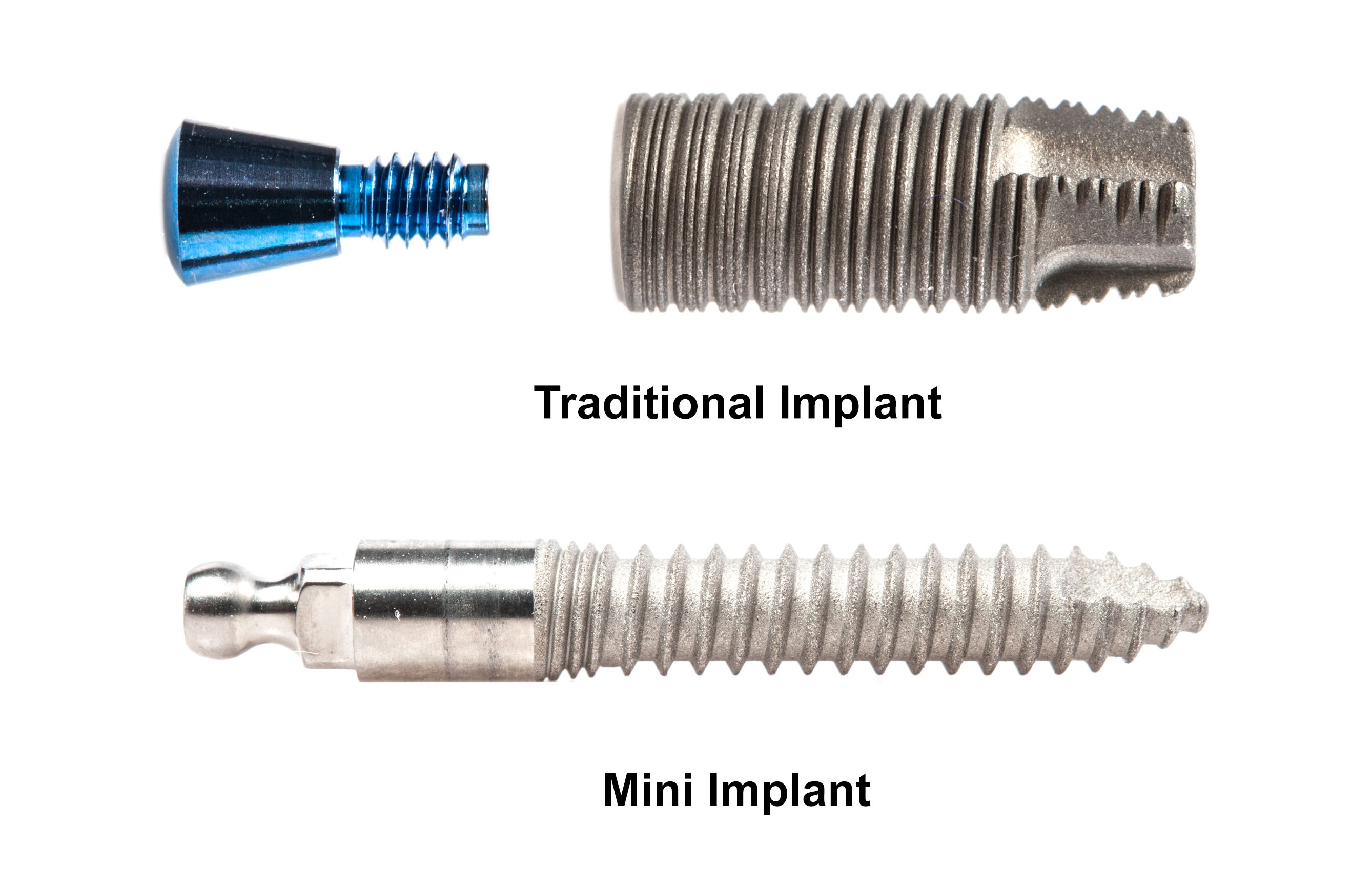
Dental Implants
Are gaps in your smile preventing you from eating, speaking, or smiling with confidence? If so, you're not alone. Tooth loss is on the rise among Americans, with 120 million missing at least one tooth. Unfortunately, losing even one tooth can profoundly affect our lives, forcing us to adjust our daily habits and lowering our self-confidence. But you don't have to resign yourself to a life of struggle. We can replace your missing teeth and restore the beauty of your smile with dental implants. At Fine Dental Care, we are committed to improving our patients' quality of life with reliable restorative procedures. What Are Dental Implants? Whether you have experienced tooth loss due to decay, gum disease, injury, cancer, or aging, we can help. Dental implants are a well-founded method for replacing missing teeth. The implant is a metal screw that we place securely in your jawbone. The screw supports an artificial crown, bridge, or denture to replace your missing teeth and restore your bite. Who Is a Good Candidate for Dental Implants? Anyone with healthy gums, sufficient jawbone density, and good oral health can benefit from dental implants to replace their missing teeth. You might consider dental implants if you want to: Replace one tooth with a dental crown Restore one or more teeth with a dental bridge Replace an entire arch of teeth with a denture Secure your existing dentures to increase their stability Dental implants may not be the right treatment option for you if you have severe decay or gum disease. These concerns should be addressed before implants are placed. Implants are not recommended for smokers since smoking can increase complications and lead to implant failure. Abstaining from smoking or quitting completely will improve your oral health and make you a stronger candidate for dental implants. If you have vascular or bone disease, take certain medications, or receive chemotherapy or radiation treatments, you may not be eligible for implants. Diabetes can also be a complicating factor. Patients with diabetes experience better treatment outcomes with dental implants when their diabetes is under control. At your consultation, we will discuss your full medical history to determine if dental implants are the best tooth replacement option for you. Traditional Dental Implants vs. Mini Dental Implants The purpose of traditional implants and mini implants is the same: to replace missing teeth. While conventional implants have their place in dentistry, the mini alternative offers significant advantages that make them our preferred treatment option. Size and Design Both traditional implants and mini implants use screws, typically made of titanium, to support a dental restoration. However, they vary greatly in size and design. The traditional implant has a three-piece construction: the metal screw or post connects to the artificial tooth using a separate connecting component called an abutment. The design of the mini implant is more streamlined, with a built-in connection point that looks like a small ball. This ball end connects to the prosthetic tooth using a rubber O-ring. As their name suggests, mini implants are significantly smaller than their conventional counterpart. The diameter of a traditional implant is about 3 to 5 millimeters, whereas a mini implant reduces the width to less than 3 millimeters, approximately the size of a toothpick. While the prosthesis is the only visible component once dental implants are placed, the smaller size of mini implants makes the procedure to place them much easier.
Video: Dental Implants
Link: Dental Implants
-
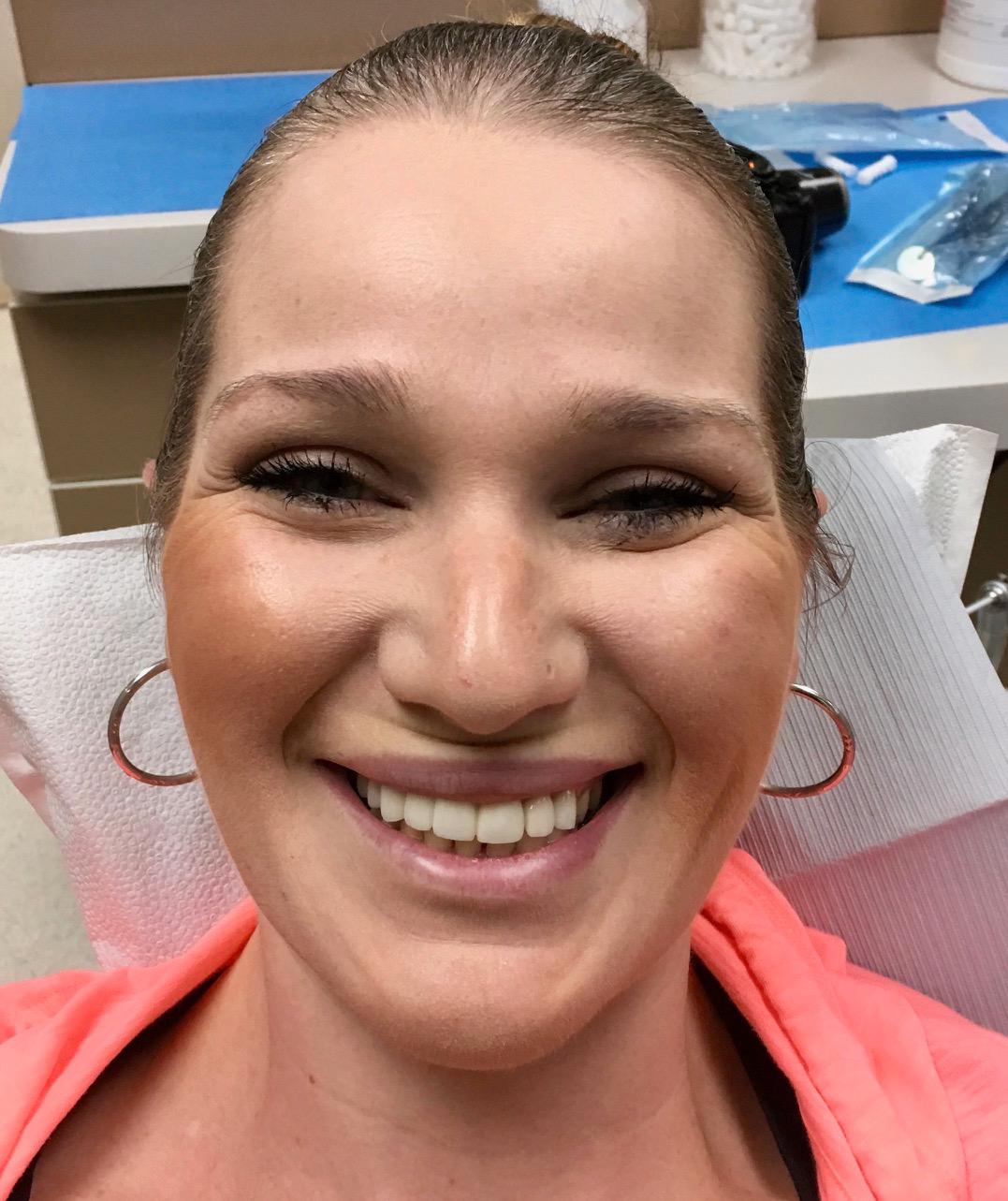
Same-Day Dental Implants
120 million people in the U.S. are missing at least one tooth. If you are missing a tooth, you have likely experienced the ways that tooth loss can impact your day-to-day life. Prompt smile restoration allows you to immediately regain your ability to eat, speak, and engage socially with little stress. It significantly reduces the emotional toll of missing teeth and the inconvenience of traditional multi-visit procedures. Same-day dental implants also offer quicker healing and minimal disruption to your daily life compared to conventional tooth loss solutions. Ultimately, restoring your teeth in a day isn't just about aesthetics; it's about swiftly improving your overall quality of life, confidence, and comfort. What Are Mini Dental Implants? Mini dental implants are small metal screws that are narrower in diameter than traditional dental implants, making them incredibly versatile. Mini dental implants address several dental issues, such as securing dentures, placing bridges, or replacing a missing tooth. Their slender design, minimally invasive approach, and quick recovery times provide patients with convenient, efficient, and comfortable solutions to their dental needs, ultimately transforming how we approach smile restoration. Dr. Todd Shatkin patented a placement technique for these implants over 20 years ago. Dr. Bruce Fine was privileged to train with him and gain valuable insights and expertise in placing mini dental implants. This innovative approach to implant dentistry has revolutionized the field, enabling patients to benefit from same-day dental implants and minimally invasive procedures. Dr. Fine's training with Dr. Shatkin underscores his commitment to staying at the forefront of dental advancements to help his patients receive the highest quality of care and access to the latest dental innovations. Mini Implants vs. Traditional Implants Traditional dental implants and mini dental implants are both remarkable innovations in implant dentistry, offering solutions for various dental issues. While they share a common goal of restoring smiles and oral function, they differ in several key aspects, each with its unique advantages: Size and Design The most noticeable difference in these implants is their size and design. Traditional dental implants are larger, averaging 5 millimeters in diameter, whereas mini dental implants are notably smaller, measuring less than 3 millimeters. The reduced size of mini implants makes them an ideal choice when there is limited bone volume or if you desire a minimally invasive procedure. Bone Density Requirements Traditional dental implants demand a higher bone density to ensure a strong and stable foundation. In cases of bone loss, patients may need bone grafts to augment bone volume. Mini dental implants, on the other hand, are a suitable option for individuals with diminished bone density. They eliminate the need for extensive bone grafting procedures. Procedure The placement of traditional dental implants usually involves a more extensive surgical procedure. It often necessitates multiple appointments, including implant placement, a healing period of several months, and the attachment of the restoration. In contrast, mini dental implants offer a less invasive and expedited process, frequently allowing for same-day restorations. Additionally, their smaller diameter often results in quicker healing and recovery times.
Video: Same-Day Dental Implants
Link: Same-Day Dental Implants
-
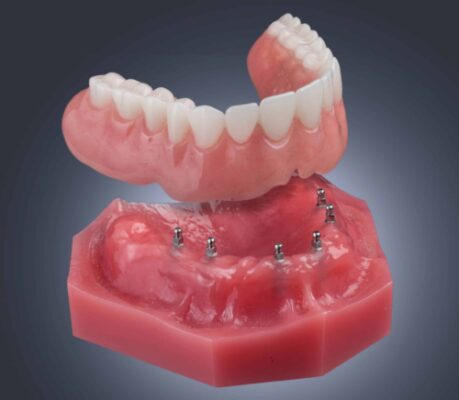
Implant Dentures
People who wear traditional acrylic dentures often experience issues with their mouth's soft tissues, like irritation, discomfort, and inflammation. The absence of teeth significantly impairs both oral function and facial aesthetics. Additionally, it adversely impacts one's overall health, nutritional well-being, and quality of life. At Fine Dental Care, we understand how important a beautiful and functional smile is to your daily life and well-being. For individuals struggling with traditional dentures or missing teeth, implant dentures are a revolutionary solution that can change your life. Mini Dental Implants: The Foundation Mini dental implants are the foundation for implant dentures. They are smaller versions of traditional dental implants. These slender titanium posts, often less than 3 mm in diameter, stabilize dentures or replace missing teeth. They are less invasive than conventional implants, which makes them a popular choice for those with insufficient bone density or those seeking a quicker and more cost-effective solution. Mini dental implants offer remarkable stability, enabling secure denture attachment. They are placed with a minimally invasive procedure done in one visit. This greatly reduces the recovery time. An array of dental prosthetics can be attached to the implants, allowing you to decide what works best for you. Mini dental implants are a practical option if you're looking to restore your smile and improve oral function with implant dentures. Types of Implant Dentures There are two main types of implant dentures: removable and fixed. Removable ones require fewer posts than fixed ones, and each comes with custom-made, natural-looking teeth. Our priority is your satisfaction, so we'll help you determine the best option for your needs. Snap-On Dentures At Fine Dental Care, we offer removable implant dentures, often called overdentures. These advanced dentures are firmly secured by attaching them to dental implants, a technique Dr. Fine has perfected since first placing implants in 1989. Compared to conventional removable dentures, his expertise ensures that these overdentures provide superior stability and comfort. If you have an existing denture that is in good condition, he can even retrofit your denture to connect securely to the implants. Semi-Removable Roundhouse Bridge We also offer an advanced dental solution called Fix on Six® bridges, a semi-removable roundhouse bridge that provides exceptional stability and function. These specialized bridges are secured using mini implants equipped with tightly fitting O-rings. This system is an updated alternative to the All-on-4® technique used with standard dental implants. Unlike traditional overdentures, Fix on Six® bridges are exclusively removed by Dr. Fine during scheduled check-up appointments. During these visits, Dr. Fine thoroughly cleans and assesses the bridge's condition to address potential issues proactively.
Video: Implant Dentures
Link: Implant Dentures
-
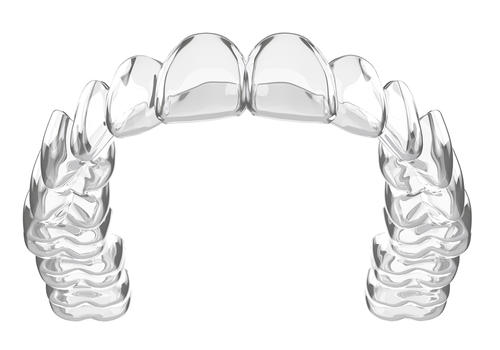
Invisalign
When it comes to orthodontics, braces are commonly associated with young adults. It almost feels like a rite of passage to experience wearing braces sometime throughout your school years. However, the American Association of Orthodontists estimates that 1 in 4 orthodontic patients today are adults. The number of adults pursuing orthodontic treatment has increased the demand for an alternative to traditional braces that suit diverse needs and preferences. Clear aligners like Invisalign trade painful and bulky wire-and-bracket braces for discreet and convenient realignment trays. With so many benefits, Invisalign has become a popular tooth-straightening option for adults and teens alike. What Is Invisalign? Clear aligners such as Invisalign are a tooth straightening option that removes many of the drawbacks of traditional braces. Developed about 25 years ago to provide an alternative to braces, these custom-made trays are made of medical-grade plastic and fit snugly over your teeth, gently guiding them into proper alignment over time. Users wear their clear aligners for approximately 22 hours every day, taking them out only to eat, brush, and floss. Each tray is worn for approximately one week, and sometimes up to two weeks before moving on to the next one in the sequence. One of the greatest benefits of using Invisalign is it lives up to its name. The clear plastic trays are nearly invisible, offering a much less noticeable option than traditional braces. Another advantage is that Invisalign is even more effective than braces when it comes to shifting your teeth. However, Invisalign can actually straighten teeth in less time. While many people must wear braces for multiple years, most Invisalign users complete their treatment within one year. Just as with braces, a retainer needs to be worn at night once the process is complete to keep teeth in their proper positions. Who Is Right for Invisalign? Invisalign can fix all the same problems that braces address, including: Crooked or misaligned teeth Gaps between teeth Overcrowded teeth Overbite, underbite, crossbite, or open bite Good candidates for Invisalign are responsible patients committed to following the treatment schedule without the reminders that constant appointments provide. Braces provide a regular appointment schedule to adjust and tighten the apparatus, but Invisalign is a more independent process that relies on the patient following the plan.
Video: Invisalign
Link: Invisalign
-
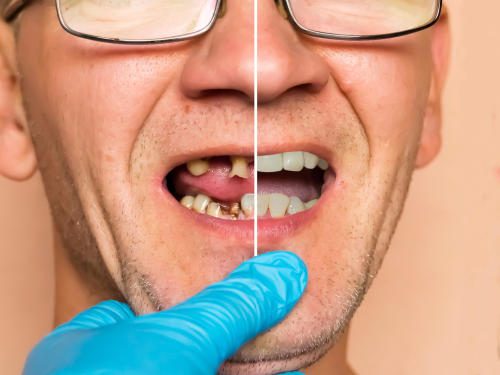
Full-Mouth Reconstruction
In Passaic County, 1 in 10 adults aged 65 years and over have had all of their teeth extracted. This may be due to several factors, including disease, decay, trauma, or a combination of these conditions. If your teeth are missing or damaged beyond repair, it can be profoundly difficult to maintain your quality of life. At Fine Dental Care, we can perform full-mouth reconstruction to improve your oral health, bite function, and smile aesthetics. Full-mouth reconstruction is a transformative treatment option that rebuilds your mouth by restoring or replacing all your teeth. What Is Full-Mouth Reconstruction? Full-mouth reconstruction, sometimes called full-mouth restoration or rehabilitation, is a comprehensive dental treatment that restores or replaces all teeth in both your upper and lower jaws. We typically recommend this procedure to individuals who have experienced severe dental damage, extensive tooth loss, or various oral health issues that affect multiple teeth. Full-mouth reconstruction often involves a combination of treatments, which may include dental crowns, bridges, dental implants, dental fillings, root canals, gum treatments, and more. The goal of this process is to enhance both the function and appearance of your teeth and overall oral health. It's a highly customized approach, and the specific treatments used depend on your unique needs and oral condition. Who Needs Full-Mouth Reconstruction? If you have extensive damage to your teeth or are suffering from tooth loss, full-mouth reconstruction may be right for you. This procedure addresses a wide range of dental concerns, including: Multiple missing teeth Extensive decay Several cracked or broken teeth Substantially worn teeth due to bruxism or erosion Loose, worn, or broken restorations Gum disease If you are experiencing one or more of these issues, a complete reconstruction can help you regain your quality of life. Our goal is to repair any damaged teeth that can be saved, extract and replace the ones that can't, and fill in existing gaps due to tooth loss.
Video: Full-Mouth Reconstruction
-

Restorative Dentistry
Approximately 12% of procedures in dental offices are restorative, according to a study that examined dental insurance claims. The goal of restorative dentistry is to re-establish the proper function of the teeth and mouth. By repairing or replacing damaged teeth, Dr. Fine can restore your oral health and prevent further damage. While diagnostic and preventative approaches are helping to decrease the need for restorative procedures, they are still widely needed to maintain optimal oral health. With nearly 40 years of experience, Dr. Fine has performed countless restorative treatments, giving his patients back the ability to eat, speak, and smile with confidence. When Is Restorative Dentistry Needed? If your teeth are not functioning as they should, you may experience pain, sensitivity, and even tooth loss. According to the ADA, restorative treatments are used most often with patients in early adolescence and middle age. As we get older, significant tooth loss increases the need for replacement procedures. Signs that you or a loved one needs a restorative treatment include: Decay and cavities: Restorative dentistry is necessary when decay and cavities have compromised the integrity of a tooth. The team at Fine Dental Care can repair and restore these teeth with treatments like fillings, crowns, or inlays/onlays to prevent further decay and restore normal function. Infection: Dental infections can lead to severe discomfort and pose health risks. Restorative procedures may include root canals to remove infected pulp or abscess drainage, ensuring the tooth is saved while preventing the spread of infection. Broken or worn teeth: Teeth that are broken, cracked, or significantly worn can be painful and negatively affect oral function. Restorative dentistry techniques, such as dental crowns, can repair and strengthen damaged teeth to restore their appearance and function. Tooth loss: Whether a tooth is already missing or requires extraction, restorative dentistry offers various solutions like dental implants, bridges, or dentures to replace missing teeth, improving both your teeth's function and your smile's appearance. Restorative Procedures Restorative dentistry plays a crucial role in maintaining and enhancing oral health. It helps prevent further dental issues by addressing problems like decay, infection, or damage in their early stages. By saving compromised teeth from extraction, restorative treatments prevent unwanted gaps that can lead to shifting teeth. This preserves the teeth's natural positioning to maintain proper bite alignment. Additionally, repairing or replacing missing teeth restores both bite function and smile aesthetics, ensuring that you can chew and speak comfortably while maintaining your self-confidence. Beyond aesthetics, restorative procedures eliminate dental pain and discomfort, which is vital for overall well-being and an improved quality of life.
Video: Restorative Dentistry
Link: Restorative Dentistry
-
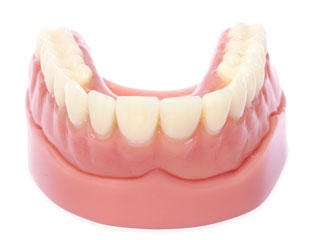
Dentures
About 20% of adults aged 65 and older have lost all their teeth. This means that many older individuals need tooth replacement solutions to help them maintain their quality of life. If you're missing all your teeth or your teeth are deteriorating, we can restore functionality to your mouth with dentures. At Fine Dental Care, we specialize in mini implant dentures, an innovative solution to tooth loss that solves many common problems associated with traditional dentures. When it comes to dentures, Dr. Bruce Fine combines his extensive experience in implant dentistry with a compassionate approach, ensuring you receive customized solutions that restore your smile and enhance your quality of life. With Dr. Fine, you can trust that you'll have a wonderful dental experience and receive the best results. What Issues Do Dentures Address? Dentures are versatile dental prosthetics that effectively address several oral health and functional issues while helping you maintain a beautiful smile. For individuals who have suffered from severe tooth loss or who need to have their teeth extracted, dentures are a reliable replacement solution. By restoring a complete arch of teeth, dentures can improve your teeth's function and enhance your smile's appearance. One of the primary purposes of dentures is to assist in chewing and digestion. Missing teeth can make chewing difficult, affecting the foods you can eat. Dentures allow you to eat a more diverse diet and help you chew food thoroughly, aiding in the digestion process. Tooth loss can also lead to speech impediments, making speaking difficult. By filling in gaps, dentures help control airflow to improve speech patterns. By replacing your missing teeth, you'll be able to speak more confidently and express yourself more articulately. In addition to eating and speaking difficulties, gaps left by missing teeth can lead to various oral health issues, including gum disease and misalignment of remaining teeth. Dentures fill these gaps, helping you to maintain your oral health. At Fine Dental Care, your dentures are highly customizable. We offer implant-supported denture options that provide superior tooth replacement solutions to meet your unique needs and preferences. We'll ensure your dentures fit comfortably, feel exceptionally secure, and look natural. With implant dentures, this is easier than ever before.
Video: Dentures
Link: Dentures
-
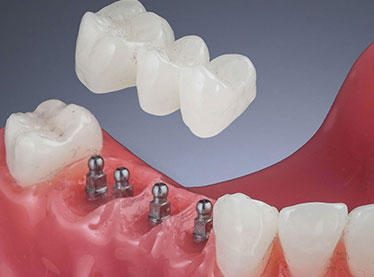
Dental Bridges
As we get older, we tend to smile and laugh less. Research shows that the average adult laughs only 15 times per day, whereas the average child laughs approximately 400 times per day. While some adults have learned to be stoic, others are enduring stressful environments or are embarrassed about their smiles. But if smiling is linked to a greater sense of happiness and well-being, what does that mean for the many adults who are hesitant to smile? Tooth loss affects our lives in more ways than one: in addition to an inability to eat and speak normally, tooth loss can make us think twice before laughing and smiling. Fortunately, dental bridges can replace gaps in your smile, improving both your oral function and quality of life. What Are Dental Bridges? A dental bridge is a prosthetic solution designed to fill the gaps left by missing teeth. A traditional bridge consists of an artificial tooth or a series of teeth anchored by crowns on both ends. These crowns are affixed to your natural teeth adjacent to the empty space, effectively "bridging" the gap. This restoration option suits individuals with one or more consecutively missing teeth. However, the neighboring teeth must be in good condition and free from problems like cavities, gum disease, or other oral health issues. If these problems exist, we will work to resolve them before we place the bridge. Why Bridges Are Important Dental bridges play a crucial role in restoring oral health and improving overall well-being following tooth loss. They offer a range of physical, functional, and emotional benefits: Maintaining proper tooth positioning: When a tooth is lost, adjacent teeth may shift or tilt toward the gap. This can lead to misalignment and further dental problems. Dental bridges halt this shifting by filling the gap, keeping neighboring teeth in their proper positions to maintain a well-aligned bite. Enhancing chewing ability: Missing teeth can make chewing difficult and less efficient. Bridges restore your ability to bite and chew comfortably. This helps ensure that you can enjoy a balanced diet with a variety of nutritious foods, which is vital for overall health. Improving speech: Gaps from missing teeth can affect speech, causing pronunciation difficulties. Bridges control airflow by closing spaces in your mouth, allowing you to speak more clearly. As a result, you can expect a boost in your self-confidence when speaking. Boosting self-esteem: Aesthetically, dental bridges provide a natural and complete smile. Restoring your smile's appearance can significantly improve your self-esteem. Many people find that a full set of teeth enhances their overall quality of life and self-confidence. Maintaining oral health: Dental bridges do more than replace missing teeth; they also help you maintain good oral hygiene. They eliminate gaps where bacteria can accumulate and make it easier to clean your teeth. Proper oral care helps prevent issues like gum disease and further tooth loss. Dental bridges not only fill gaps but also help to maintain your oral health and improve your overall well-being.
Video: Dental Bridges
Link: Dental Bridges
-
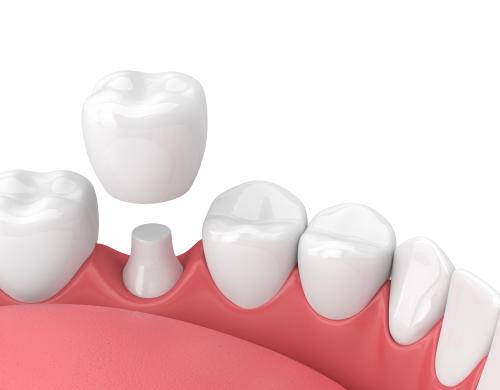
Dental Crowns
Dental crowns are a simple treatment that goes a long way for your oral health. Caring for a damaged tooth is critical, as neglect can lead to various dental issues. An untreated damaged tooth can become a breeding ground for infection, causing pain and discomfort. If not addressed promptly, this can progress to gum disease, abscesses, or tooth loss. In addition, a compromised tooth may impact your ability to eat, speak, and maintain proper oral hygiene. Suffering this much disrupts your day-to-day life and makes it difficult to enjoy simple things. What's more, untreated dental problems often escalate in complexity, requiring more extensive and costly treatments in the long run. Timely dental care is essential for maintaining dental health, preventing complications, and creating a robust, pain-free smile. What Is a Dental Crown? The rule is that if two-thirds of the tooth is missing, it's time for a crown. A dental crown is a custom-made, tooth-shaped cover that encases a damaged or weakened tooth. Crowns restore a tooth's strength, shape, size, and appearance. They reinforce teeth with excessive fillings, cap teeth after root canal treatment, cover mini dental implants, or hold a bridge in place. Crowns can last forever since they are inorganic and can't get cavities. However, the underlying tooth can still decay, so it is important to maintain good oral hygiene so the new crown can last a lifetime. Brushing, flossing, and routine check-ups are as important to your crown as your other teeth. Benefits of Dental Crowns Dental crowns offer a versatile and transformative dental solution with a range of advantages that collectively contribute to a healthier smile. One of the benefits is the enhanced aesthetics they provide. Dental crowns are a powerful cosmetic tool that conceal issues such as discoloration, misshapen teeth, or imperfections. This improves the visual harmony of your smile. Beyond aesthetics, dental crowns are engineered to deliver restored functionality. They provide structural support to weakened or damaged teeth, which helps you to eat, speak, and chew comfortably. Durability is another significant advantage. Dental crowns are known for their longevity when properly cared for, offering a cost-effective and sustainable investment in your oral health. They can last for decades, which makes them an ideal choice for long-term dental solutions. Also, dental crowns act as protective shields for compromised teeth. They create a barrier against further damage or decay, preserving your natural teeth and often preventing the need for more invasive treatments. However, it is important to maintain oral hygiene so bacteria don't ruin your protection. Dental crowns are truly versatile in their many purposes. They are used for cosmetic enhancement, restoring functionality, and dental alignment, which caters to a broad spectrum of dental needs. Crowns can be tailored to your specific requirements, whether you seek a seamless and appealing smile or require structural support and protection.
Video: Dental Crowns
Link: Dental Crowns
-

Emergency Dentistry
Our mouths are remarkable, serving vital functions like speaking, eating, and expressing emotions. We often take their seamless operation for granted. However, the unexpected can happen at any moment. Dental emergencies can bring about sudden pain, discomfort, or trauma and disrupt our daily lives. These unforeseen situations remind us of how important our dental health is and the need for immediate, expert care. That's where emergency dentistry comes in. The team at Fine Dental Care understands the urgency of such situations. We are here to provide rapid, compassionate solutions to help you regain comfort and confidence swiftly. You can call us with your emergency, and we'll see you that same day and often within the hour. For after-hours care, follow the recorded instructions when you call, and we will get back to you as soon as possible. Our top priority is your oral health, and we're ready to assist when unexpected emergencies arise. What's Not an Emergency? Not every dental concern qualifies as an emergency. Understanding what does not constitute a dental emergency helps you distinguish when immediate care is required. Routine dental matters, such as regular check-ups, cleanings, and planned treatments, are not emergencies. Minor issues like a chipped tooth, a loose dental crown, or a dull toothache without severe pain, swelling, or infection are typically not classified as emergencies. Similarly, orthodontic adjustments or issues with braces that do not lead to severe pain or breathing difficulties are considered non-emergencies. While non-emergency issues should still be addressed promptly, they do not demand immediate or after-hours attention. Regular dental appointments and scheduled treatments can be managed during normal office hours. In contrast, dental emergencies, marked by intense pain, infection, trauma, or uncontrollable bleeding, necessitate immediate contact with an emergency dentist like Dr. Fine for swift and specialized care.
Video: Emergency Dentistry
Link: Emergency Dentistry
-

Oral Surgery
Oral surgery is important in maintaining both dental health and well-being. Different issues require surgical tooth extraction, such as impacted wisdom teeth. Proper extraction methods are critical in preventing complications, reducing the risk of infection, and ensuring minimal discomfort during and after the procedure. Skillful and precise tooth extraction techniques also help preserve the surrounding bone and tissues, which promotes a smoother recovery process and potentially reduces the need for more extensive dental interventions. Whether it's the removal of impacted wisdom teeth or severely decayed or damaged teeth, Dr. Fine's precise techniques and expertise in oral surgery play an important role in ensuring your safety and the long-term health of your smile. What to Expect During the Oral Surgery Process Surgical tooth extraction is vital for removing wisdom teeth or any teeth below the gum line. This technique is essential when teeth cannot be easily accessed or extracted by simple tooth extraction. Dr. Fine does a thorough evaluation to determine the tooth's condition and position as well as the extent of its impaction or damage. For the procedure, Dr. Fine will apply local anesthesia to numb the treatment area. Our practice also happily offers sedation options for those who have dental phobia or anxiety. Dr. Fine can administer nitrous oxide (laughing gas) or use oral conscious sedation, which you take in pill form. These options help to ensure your comfort and alleviate any worries. Once you are prepped and comfortable, he makes a little incision in the gum line to access the tooth. Sometimes, the tooth must be broken into smaller parts for easier removal. Specialized instruments are delicately used to detach the tooth from the surrounding bone and tissues. When the tooth is successfully removed, the extraction site undergoes thorough cleaning and disinfection. Post-extraction, Dr. Fine sutures the incision to promote proper healing. Following the process, you'll be instructed to bite on a gauze pad to promote blood clotting, an essential part of the healing process. While recovery can vary depending on the patient and the complexity of the procedure, he will provide comprehensive aftercare instructions to ensure a smooth and comfortable recovery process. We guarantee a comfortable experience throughout the surgical tooth extraction procedure. Dr. Bruce Fine and his team at Fine Dental Care are experienced in ensuring a safe and comfortable experience. Getting Ready for Oral Surgery At Fine Dental Care, your care and comfort are a priority throughout the process. Tooth extractions are a safe procedure; however, some medical conditions may require antibiotic use. Before your appointment, we'll talk about your medical history, including the medications and supplements you take. During your visit, we advise you to wear comfortable clothes and no makeup, especially lipstick. For patients requiring sedation, early arrival is recommended to allow the sedative time to work. You will also need someone to drive you home after your appointment if you opt for oral conscious sedation.
Video: Oral Surgery
Link: Oral Surgery
Categories
Dentistry(973)636-4646 (973)-636-4646 +19736364646 (973)633-5440 (973)-633-5440 +19736335440
Map 600 Valley Rd.
Loading map...











